| Listing 1 - 10 of 13 | << page >> |
Sort by
|
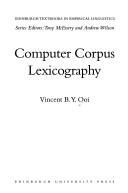
ISBN: 074860815X 0748609962 9780748608157 Year: 1998 Publisher: Edinburgh Edinburgh University Press
Abstract | Keywords | Export | Availability | Bookmark
 Loading...
Loading...Choose an application
- Reference Manager
- EndNote
- RefWorks (Direct export to RefWorks)
Lexicology. Semantics --- Mathematical linguistics --- Computational linguistics --- Lexicology --- Lexicography --- Linguistique informatique --- Lexicologie --- Lexicographie --- Data processing. --- Informatique --- Data processing --- #KVHA:Lexicografie --- Computational linguistics. --- Lexicology - Data processing --- Lexicography - Data processing --- Corpus (linguistics)
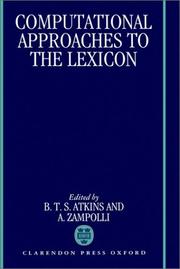
ISBN: 0198239793 9780198239796 Year: 1994 Publisher: Oxford Oxford University Press
Abstract | Keywords | Export | Availability | Bookmark
 Loading...
Loading...Choose an application
- Reference Manager
- EndNote
- RefWorks (Direct export to RefWorks)
Lexicology. Semantics --- Mathematical linguistics --- Computer. Automation --- Lexicography --- Lexicology --- Data processing --- Lexicografie --- Lexicologie --- Data processing. --- gegevensverwerking --- -Lexicography --- -#KVHA:Lexicologie --- Encyclopedias and dictionaries --- English language --- Language and languages --- gegevensverwerking. --- #KVHA:Lexicologie --- Computational linguistics --- Lexicography - Data processing --- Lexicology - Data processing --- Gegevensverwerking.
Book
ISBN: 3525205430 9783525205433 Year: 1979 Volume: 272 Publisher: Göttingen : Vandenhoeck und Ruprecht,
Abstract | Keywords | Export | Availability | Bookmark
 Loading...
Loading...Choose an application
- Reference Manager
- EndNote
- RefWorks (Direct export to RefWorks)
English language --- Psalters --- Lexicology --- Data processing --- Catholic Church --- Liturgy --- Texts --- Manuscripts --- Transmission of texts --- Data processing. --- English language - Old English, ca 450-1100 - Lexicology - Data processing --- Psalters - England - Data processing
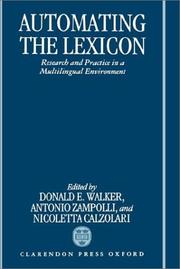
ISBN: 0198239505 9780198239505 Year: 1995 Publisher: Oxford Oxford University Press
Abstract | Keywords | Export | Availability | Bookmark
 Loading...
Loading...Choose an application
- Reference Manager
- EndNote
- RefWorks (Direct export to RefWorks)
#KVHA:Taalkunde --- #KVHA:Lexicologie --- #KVHA:Automatisering --- gegevensverwerking. --- Gegevensverwerking. --- Lexicography --- -Lexicology --- -English language --- Language and languages --- Data processing --- Lexicology --- Lexicology. Semantics --- Mathematical linguistics --- Information systems --- Computational linguistics --- Lexicografie --- Lexicologie --- Data processing. --- Lexicographie --- Informatique --- Lexicology - Data processing --- Lexicography - Data processing
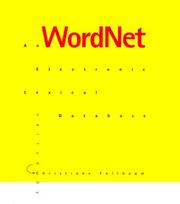
ISBN: 026206197X 9780262272551 9780262061971 0262272555 Year: 1998 Publisher: Cambridge, Mass. MIT Press
Abstract | Keywords | Export | Availability | Bookmark
 Loading...
Loading...Choose an application
- Reference Manager
- EndNote
- RefWorks (Direct export to RefWorks)
Lexicology. Semantics --- Mathematical linguistics --- Artificial intelligence. Robotics. Simulation. Graphics --- English language --- Semantics --- Lexicology --- Data processing --- -Lexicology --- -Semantics --- -Formal semantics --- Semasiology --- Semiology (Semantics) --- Comparative linguistics --- Information theory --- Language and languages --- Meaning (Psychology) --- Germanic languages --- Data processing. --- -Data processing --- Computational linguistics --- Electronic data processing --- WordNet. --- Word net --- Semantics - Data processing --- Lexicology - Data processing --- English language - Data processing --- SEMANTICS --- LEXICOLOGY --- ENGLISH LANGUAGE --- DATA PROCESSING
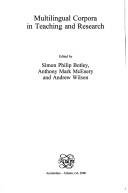
ISBN: 9042005416 9042005513 9004485201 9789042005419 Year: 2000 Volume: 22 Publisher: Amsterdam Rodopi
Abstract | Keywords | Export | Availability | Bookmark
 Loading...
Loading...Choose an application
- Reference Manager
- EndNote
- RefWorks (Direct export to RefWorks)
Mathematical linguistics --- Translation science --- Didactics of languages --- Computational linguistics --- Lexicology --- Translating and interpreting --- Data processing --- #KVHA:Taalonderwijs --- #KVHA:Lexicologie --- Didactiek van de talen --- Vertaalkunde --- Wiskundige taalkunde --- Computerlinguïstiek. --- Corpus linguistics. --- Meertalige corpora. --- Taal en talen --- Vreemdetalenonderwijs --- Vreemdetalenonderwijs en corpus linguistics. --- didactiek --- gebruik van technologie. --- didactiek en corpus linguistics. --- didactiek. --- gebruik van techologie. --- Lexicology - Data processing --- Translating and interpreting - Data processing
Book
ISBN: 9001812112 9789001812119 Year: 1976 Publisher: Groningen : Tjeenk Willink,
Abstract | Keywords | Export | Availability | Bookmark
 Loading...
Loading...Choose an application
- Reference Manager
- EndNote
- RefWorks (Direct export to RefWorks)
Lexicology. Semantics --- Mathematical linguistics --- Dutch language --- Computer. Automation --- Néerlandais (Langue) --- Lexicology --- Data processing --- Lexicologie --- -Dutch language --- -Flemish language --- Netherlandic language --- Germanic languages --- -Data processing --- Nederlandse taal --- Data processing. --- Lexicology. --- lexicologie --- -Lexicology --- lexicologie. --- Lexicologie. --- Néerlandais (Langue) --- Flemish language --- Lexicology&delete& --- Dutch language - Lexicology --- Dutch language - Lexicology - Data processing
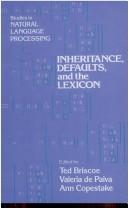
ISBN: 0521430275 0521028051 0511663641 9780521430272 9780511663642 9780521028059 Year: 1993 Publisher: Cambridge Cambridge University Press
Abstract | Keywords | Export | Availability | Bookmark
 Loading...
Loading...Choose an application
- Reference Manager
- EndNote
- RefWorks (Direct export to RefWorks)
The lexicon is now a major focus of research in computational linguistics and natural language processing (NLP), as more linguistic theories concentrate on the lexicon and as the acquisition of an adequate vocabulary has become the chief bottleneck in developing practical NLP systems. This collection describes techniques of lexical representation within a unification-based framework and their linguistic application, concentrating on the issue of structuring the lexicon using inheritance and defaults. Topics covered include typed feature structures, default unification, lexical rules, multiple inheritance and non-monotonic reasoning. The contributions describe both theoretical results and implemented languages and systems, including DATR, the Stuttgart TFS and ISSCO's ELU. This book arose out of a workshop on default inheritance in the lexicon organized as a part of the Esprit ACQUILEX project on computational lexicography. Besides the contributed papers mentioned above, it contains a detailed description of the ACQUILEX lexical knowledge base (LKB) system and its use in the representation of lexicons extracted semi-automatically from machine-readable dictionaries.
Lexicology. Semantics --- Mathematical linguistics --- Information systems --- Lexical grammar --- Lexicology --- Grammaire lexicale --- Lexicologie --- Data processing --- Informatique --- --Data processing --- 92 --- -Lexicology --- -English language --- Language and languages --- Generative grammar --- Grammar, Comparative and general --- gegevensverwerking --- -Data processing --- gegevensverwerking. --- Computational linguistics --- --Lexicologie --- Arts and Humanities --- Language & Linguistics --- Data processing. --- Lexicology - Data processing --- Lexical grammar - Data processing --- LEXICOLOGY --- LEXICAL GRAMMAR --- DATA PROCESSING
Book
ISBN: 3484319178 9783484319172 Year: 1987 Volume: Bd. 17 Publisher: Tübingen : Niemeyer,
Abstract | Keywords | Export | Availability | Bookmark
 Loading...
Loading...Choose an application
- Reference Manager
- EndNote
- RefWorks (Direct export to RefWorks)
Lexicology --- Machine translating. --- Lexicologie --- Traduction automatique --- Data processing. --- Informatique --- Machine translating --- Data processing --- -Machine translating --- Automatic translating --- Computer translating --- Electronic translating --- Mechanical translating --- Algorithms --- Applied linguistics --- Artificial intelligence --- Computational linguistics --- Information theory --- Translating and interpreting --- Cross-language information retrieval --- Translating machines --- English language --- Language and languages --- Natural language generation (Computer science) --- Lexicology - Data processing
Book
ISSN: 03446778 ISBN: 3484311681 3110941015 9783484311688 Year: 1996 Volume: 168 Publisher: Tübingen Niemeyer
Abstract | Keywords | Export | Availability | Bookmark
 Loading...
Loading...Choose an application
- Reference Manager
- EndNote
- RefWorks (Direct export to RefWorks)
In der Phraseologieforschung, der Fremdsprachendidaktik und der Metalexikographie werden Kollokationen zumeiste als Elemente der langue aufgefaßt und im Graubereich zwischen freien Wortverbindungen und Phrasemen angesiedelt. Wenig Gemeinsamkeiten mit dieser Auffassung zeigt die kollokationstheorie des britischen Kontextualismus, die zum Ausgangspunkt der vorliegenden Arbeit genommen wurde. Kollokationen in diesem Sinne basieren, gemäß dem kontextualistischen Postulat, nur den tatsächlichen Sprachgebrauch zu untersuchen, auf Elementen der parole. Sie werden zu Zwecken lexikalischer Analyse eigens gebildet und bestehen aus beliebigen Zusammenfassungen sprachlicher Einheiten, die in konkreten Texten in syntagmatischer Nähe zueinander vorkommen. Ziel der Arbeit ist es, die Kollokationstheorie des Kontextualismus in ein operationales lexikalisches Sprachanalysenmodell, welches auch für die maschinelle Sprachverarbeitung nutzbar ist, umzusetzen. Dieses Sprachanalysemodell soll insbesondere dazu dienen, die maschinelle Disambiguierung im Falle polysemer oder homonymer Wörter sowie die maschinelle Identifizierung von Phrasemen - Aufgaben, die die maschinelle Sprachverarbeitung noch immer vor große Probleme stellen - handhabbarer zu machen. Bisherige Problemlösungsstrategien bestanden vor allem darin, entweder Restriktionen für die Textproduktion vorzusehen oder spezielle Basen zur Repräsentation sprachexternen Wissens zu kompilieren. Das hier entwickelte Analysemodell stützt sich dagegen auf die Annahme, daß die Identifizierung und Charakterisierung sprachlicher Einheiten allein auf der Grundlage des kollokativen Verhaltens von Formativen in konkreten Texten, wie es sich anhand von Häufigkeit und Signifikanz ihres Miteinandervorkommens bestimmen läßt, geleistet werden kann. Die Miteinbeziehung von Wissen über außersprachliche Entitäten wird somit nicht als notwendig erachtet. Endergebnis eines Analyseverfahrens der hier projektierten Form ist ein lexikalisches Netz, das im Anschluß als Datenbasis für vielerlei Arten von Textgenerierungs- und Textanalyseaufgaben genutzt werden kann.
-Computational linguistics --- Semantic prosody --- Computational linguistics. --- Discourse analysis --- Collocation (Linguistics) --- Lexicology --- Data processing. --- Computational linguistics --- Automatic language processing --- Language and languages --- Language data processing --- Linguistics --- Natural language processing (Linguistics) --- Data processing --- Semantics --- Applied linguistics --- Cross-language information retrieval --- Mathematical linguistics --- Multilingual computing --- Discourse analysis - Data processing. --- Collocation (Linguistics) - Data processing. --- Lexicology - Data processing.
| Listing 1 - 10 of 13 | << page >> |
Sort by
|

 Search
Search Feedback
Feedback About UniCat
About UniCat  Help
Help News
News